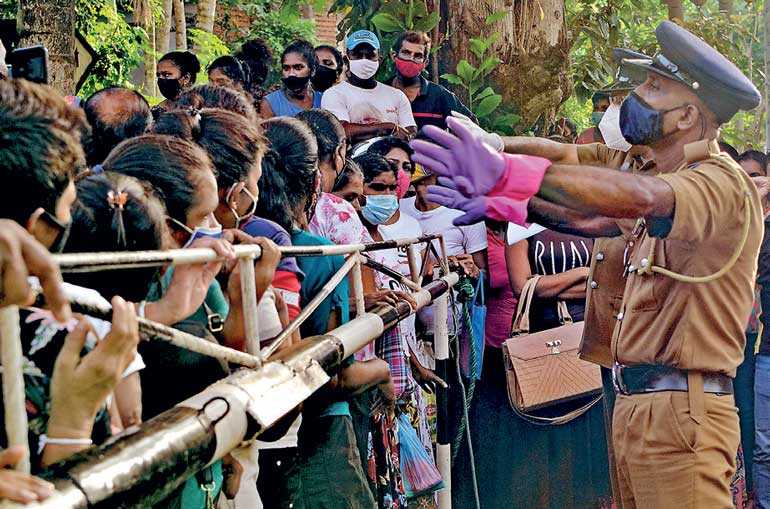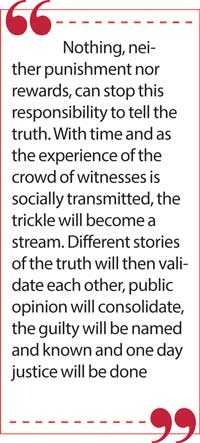Wednesday Feb 18, 2026
Wednesday Feb 18, 2026
Tuesday, 15 December 2020 00:02 - - {{hitsCtrl.values.hits}}

Since social stigma rates prisoners at the bottom of the grid, public outrage at violence against prisoners tends to be muted. But for numerous grieving mothers and fathers, spouses and children, these persons are loved and cherished family – Pic by Shehan Gunasekara
The Mahara Prison violence has shocked the nation and stirred feelings of disbelief and indignation. A wide cross section of persons and groups; class, ethnic and political, want to know how so many inmates, under the 24-hour protection and care of the State, could have been killed and injured, in one tragic incident.
The value of the prisoner
Since social stigma rates prisoners at the bottom of the grid, public outrage at violence against prisoners tends to be muted. But for numerous grieving mothers and fathers, spouses and children, these persons are loved and cherished family.
When they plead for information on the truth, and demand justice for their loved ones, they assert the universal value and rights of the prisoner and expose the prejudice in our societies.
False witness
The explanation by some in and out of parliament, that this was a riot in which prisoners attacked and harmed each other, is farfetched. It was hastily offered, before post mortems and investigations had even begun. In any case, few citizens today believe those who speak, to protect and better their status and privileges.
Since this explanation has been adequately refuted by civil society, professionals and Opposition parliamentarians, there is no need to restate what has been eloquently said.
But the duty of civic minded persons and groups, to speak out when such brazen acts of violence occur, remains. This responsibility doubles when the victims are vulnerable humans with no voice and little access to what remains of our free society.
True witnesses
In tragedies like this, it is important to bear in mind that an alternative version of the truth always emerges, especially when the official version is questionable. From the outset, scores of Sri Lankans, including prison and other security personnel as well as doctors and other medical personnel, were privy to the sequence of the debacle. 
Some of these persons, saw and heard what happened because they were there when it happened, others moved casualties to hospitals, some examined the dead and treated the injured, and still others, cleaned up the mess. It is the opinion formed by these witnesses that have constructed a credible version of the truth.
Regardless of subsequent attempts to re-write the script, this first hand version of witnesses serve as informal ‘People’s Tribunals.’ What they have seen and heard, contests the disinformation from sources steeped in vested interests.
Consequently, among trusted groups and in the privacy of homes, the truth is being shared, sifted and passed on. Nothing, neither punishment nor rewards, can stop this responsibility to tell the truth. With time and as the experience of the crowd of witnesses is socially transmitted, the trickle will become a stream. Different stories of the truth will then validate each other, public opinion will consolidate, the guilty will be named and known and one day justice will be done.
A prison within
In institutional violence like this, those who distort the truth, end up in a more haunted prison than the one in which the vulnerable were violated. Of their own choice, they end up victims of piles of deceit and secrets that engulf them in misery. To be endowed with responsibility to protect the helpless and harassed, and to disregard this sacred duty, traps people behind a façade of pretence that ultimately robs them of the freedom to be humane.
This is the point of a parable on reconciliation related by Jesus. Those who disregard the requirement to come to terms with a wounded brother or sister, end up in a prison of their own making. The parable implies that, once in such a place, it is near impossible to get out. The misery of such a prisoner is compounded, as he does not know that he holds the keys to his freedom. (Matt. 5. 21-26)
The better option
There does not seem to be any sense in calling for impartial investigations, now. This will not happen. The far more realistic option is to facilitate the truth emanating from the ‘People’s Tribunals’ and remind those who distort the truth, that there is still a chance for them to be true to themselves.
Where the real guilty listen and change, they will know true freedom. It may cost them their highly loaded privileges, but they will gain the right to sleep at night.
Where the real victims and witnesses of the debacle hold onto their stories of what actually happened, they will gain respect. It may cost them heavily, but they will spread courage and open the eyes of a blind and troubled nation.
With peace and blessings to all.